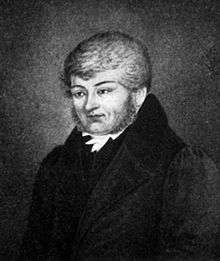Johannes Jacob Hegetschweiler

Johannes Jacob Hegetschweiler (4 December 1789, Rifferswil – 9 September 1839, Zürich) was a Swiss physician and botanist. He is remembered for his investigations of Alpine vegetation.
Biography
In 1809 he studied medicine at the medical-surgical institute in Zurich, followed by medical studies at the University of Tübingen as a pupil of Johann Heinrich Ferdinand von Autenrieth. While at Tübingen, he also attended lectures in natural sciences given by Carl Friedrich Kielmeyer.[1] Later on, he worked as a physician at the typhus hospital in Rheinau, and from 1814 to 1831, he served as a doctor in the town of Stafa.[2]
From 1831 to 1839 he held various posts with the cantonal government in Zürich. During the so-called Züriputsch of September 6, 1839, as a mediator between government militia and insurrectionists, he was wounded in the head from a bullet fired by the insurgents, and died three days later on September 9.[2][3]
The botanical genus Hegetschweilera Heer, Regel (1842) commemorates his name,[4] as does taxa with the specific epithet of hegetschweileri.[5]
Published works
Among his better written efforts was an enumeration of Swiss plants, titled Beyträge zur einer kritischent aufzählung der Schweizer pflanzen (1831),[2] and a new edition of Johann Rudolf Suter's Flora Helvetica (1822).[6] After his death, Oswald Heer edited and published Hegetschweiler's Flora der Schweiz (1840).[7]
References
- ↑ Hegetschweiler, Johannes at Deutsche Biographie
- 1 2 3 Hegetschweiler, Johannes- Historisches Lexikon der Schweiz
- ↑ Clarification of a political assassination in 1839: statesman Johannes Hegetschweiler shot during civil unrest in Zurich Schweiz Rundsch Med Prax. 1992 May 26;81(22):718-23.
- ↑ BHL Taxonomic literature : a selective guide to botanical publications
- ↑ Etymological Dictionary of Grasses by Harold T. Clifford, Peter D. Bostock
- ↑ OCLC WorldCat Flora helvetica
- ↑ Flora der Schweiz - Titre - ETH-Bibliothek Zürich (NEBIS)
- ↑ IPNI. Hegetschw.